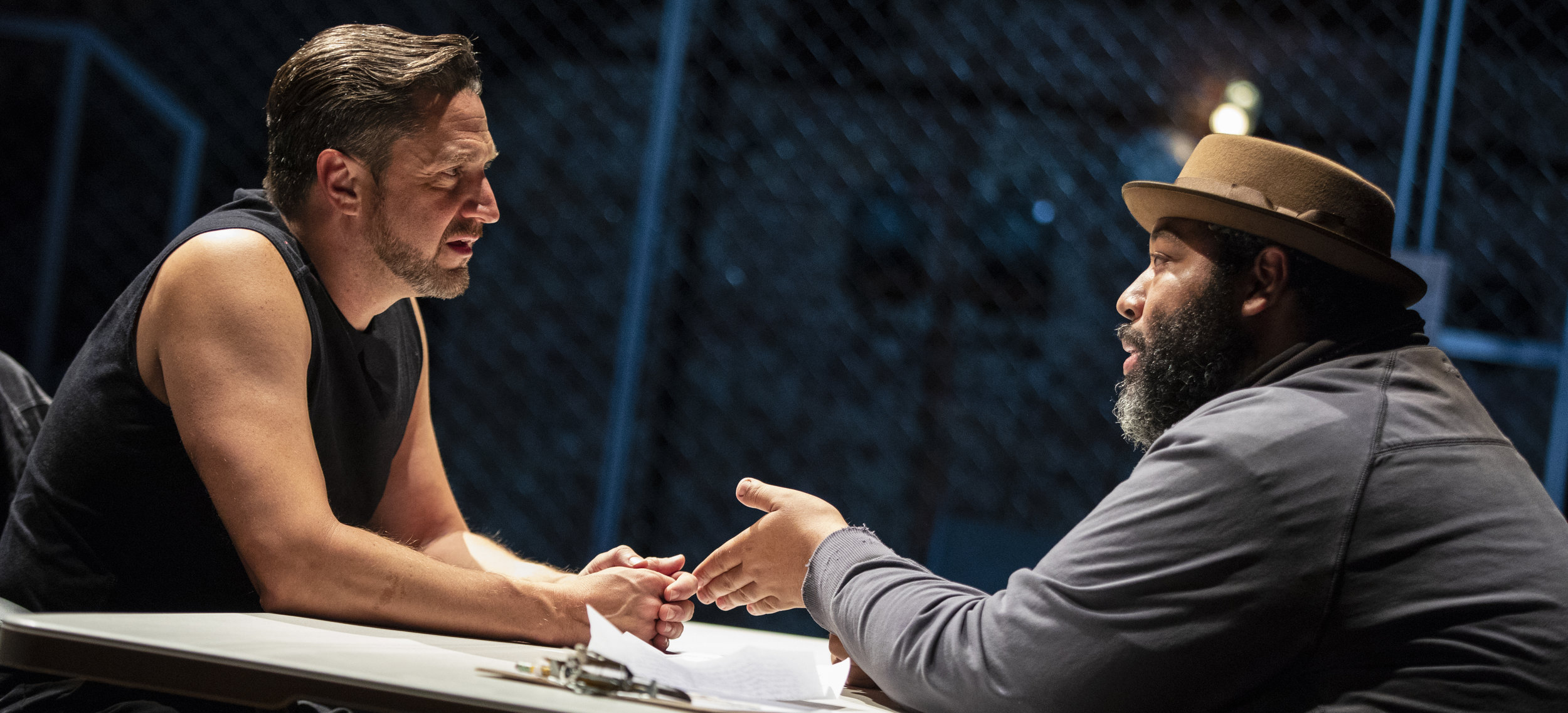Bertolt Brecht’s The Resistible Rise of Arturo Ui, written in 1941, has not aged well. Brecht himself never saw a production of his allegory about the rise of German National Socialism, and what improvements he might have made in rehearsal cannot be known, but John Doyle’s version at Classic Stage Company does little to ameliorate a play rife with didacticism, pretentious faux-Shakespearean speeches, and characters baldly modeled on Adolf Hitler and his cronies.
In keeping with Brechtian theory, announcements of events help the audience along: here, loudspeakers describe turning points in German history, from the Nazi appropriation of Hindenburg’s support to the Anschluss with Austria in 1938. A chorus periodically chants a forecast or a commentary, such as, at the opening:
Raúl Esparza (left) plays the title role and Eddie Cooper is Ernie Roma in Bertolt Brecht’s The Resistible Rise of Arturo Ui. Top: A scene from the play, with George Abud (center).
…The mysterious
Dullfleet murder!,,,
Justice lies in coma!
Togetherness in gangsterdom!...
Who rubbed out Ernie Roma?...
And in the grand finale of the show:
Crooks conquering the town of Cicero!
Brecht chose satire and allegory as the primary means of telling his story of gangsters in Chicago taking over the Cauliflower Trust—a grocery combine that stands in for Weimar Germany. Ui’s henchmen have names that correspond to their Nazi models: Givola for Goebbels, Giri for Goering, Roma for Ernst Roehm.
They speak in Shakespearean iambs, a counterpoint to their criminal status. The disconnection between flowery language and lowlife shenanigans is a comic technique that Charles Portis used effectively in True Grit and that the Oscar-winning film Tom Jones employed in 1963. In George Tabori’s translation, also from 1963, it’s all musty and too clever by half. “But I won’t tolerate no hebetude,” says Ui at one point, using a nifty word scarcely heard or written any more, with a meaning not discernible from the context. The surprise of the formal language from the mouths of thugs quickly wears thin.
More direct references to Shakespeare are also distracting. Richard III is invoked by name, for instance, and a late scene echoes Richard’s wooing of Lady Anne. Apart from that, Ui recites most of “Friends, Romans, countrymen” and later says, “Is this a Luger that I see before me?” And Roma refers to his “salad days.”
The performers, for the most part well-spoken and clear, bring little nuance to the blunt script. The exception is Raúl Esparza in the title role. As Ui, he sports a creditable Brooklyn accent and invests the character’s low self-esteem with comic spin that may recall a certain President’s narcissism:
Nobody talks about me any more.
Yeh, fame is kinda short-lived in this burg!
“Whatever happened to Arturo Ui?”
Two months without a brawl, and twenty murders
All forgotten.
As he climbs the ladder, he takes lessons in walking and rehearses throwing blame on others—“Oh, that doesn’t sound right!” Ui’s character veers toward self-aggrandizement, and Esparza calibrates the danger and the comedy superbly. By the time he says, “What I demand is trust and trust again!” it’s clear that the revival is keyed to this particular moment in American political life. But it makes the Julius Caesar in Central Park with a Donald Trump lookalike in the title role seem subtle by comparison.
Omozé Idehenre plays Betty Dullfeet, and Christopher Gurr is her husband. Photographs by Joan Marcus.
Also coming off well is Eddie Cooper’s Ernie Roma, a giant of a thug who emanates danger and power, but speaks the heightened lingo with the finesse of Sydney Greenstreet. George Abud handles the words authoritatively and often quickly, but with admirable clarity, although his two roles, Clark and Ragg, are secondary. Actress Omozé Idehenre is a formidable (male) opponent of Ui and the Cauliflower Trust; director John Doyle’s gender-blind casting neither adds nor detracts.
Doyle has the actors rush around and shout a good deal to disguise the talkiness of the play, but there is an immediacy in his three-quarters staging. Doyle has designed a sort of rough theater set: a chain-link fence perhaps 20 feet high separates the upstage, which contains lockers, from the playing area, and it lends an industrial coldness to the proceedings, something Brecht would have appreciated. Hats dot the upstage wall (costume designer Ann Hould-Ward’s selection of pork pies, bowlers, cloth caps, et al. are a significant plot element, scalps for Elizabeth A. Davis’s ruthless Giri: “Her prime perversion, believe it or not,/Collecting the hats of the people she shot.”)
Brecht aficionados may find it worth the effort to add Arturo Ui to their lists, but this tiresome production may discourage those who have never seen Brecht’s great works—Life of Galileo, Mother Courage and Her Children, and The Caucasian Chalk Circle—from giving them a try. That would be too bad.
The Resistible Rise of Arturo Ui runs through Dec. 22 at Classic Stage Company (136 E. 13th St.) Evening performances are at 7 p.m. Tuesday through Thursday and at 8 p.m. Friday and Saturday; matinees are at 2 p.m. Saturday and Sunday; an additional student matinee is scheduled for Nov. 29, and there are no performances on Nov. 22 or 23. Tickets may be purchased by calling (866) 811-54111 or visiting classicstage.org.









